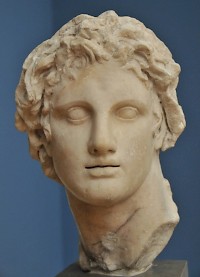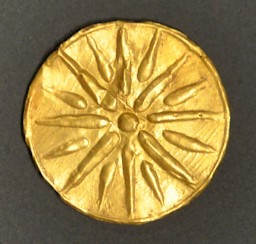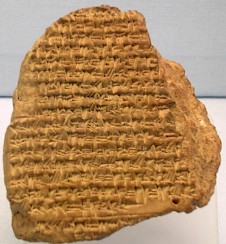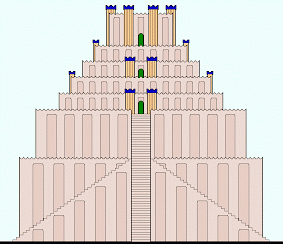Alexander's Last days
Alexander the Great (*356; r. 336-323): the Macedonian king who defeated his Persian colleague Darius III Codomannus and conquered the Achaemenid Empire. During his campaigns, Alexander visited a.o. Egypt, Babylonia, Persis, Media, Bactria, the Punjab, and the valley of the Indus. In the second half of his reign, he had to find a way to rule his newly conquered countries. Therefore, he made Babylon his capital and introduced the oriental court ceremonial, which caused great tensions with his Macedonian and Greek officers.
1.

After their victory at Gaugamela, on 1 October 331 B.C.E., the Macedonians occupied Mesopotamia. They took its capital Babylon, fought their way through the Zagros mountains, captured the Persian capital Persepolis, hunted down Achaemenid king Darius III Codomannus, rooted out resistance in eastern Iran and Uzbekistan, and conquered the Punjab. Alexander wanted to advance to the delta of the Ganges, but his soldiers refused and the Macedonians returned to the west, to Persia and Babylonia. Never had a conqueror been so successful, and many people -Alexander included- thought that the king of Macedonia was more than an ordinary human being. He was regarded as the son of at least three supreme gods (the Greek Zeus, the Egyptian Ra, the Libyan Ammon), was believed to be protected by the sun god, and had been hailed as an avatar of Vishnu. In several Greek city-states, he was venerated as an invincible god.
When Alexander was on his way to Babylon, in the spring of 323, many envoys approached him. Most of them offered tokens of submission, hoping to ward off an invasion, but one delegate was more interested in the well-being of the king himself. The Greek historian Diodorus of Sicily describes him as a Babylonian astronomer named Belephantes, which is probably a rendering of the Babylonian name Bêl-apla-iddin. His message was sincere and simple: Alexander was in mortal danger and should avoid Babylon. The king was disturbed.
The Babylonian astronomers, or Chaldaeans, were specialists in the celestial omens. On many occasions they had warned kings of approaching calamities, had proposed certain sacrifices, and had been able to avert disasters. In 331, they had accurately predicted Alexander's invasion of Mesopotamia and his victory at Gaugamela, and ever since, the Macedonian king attached great value to their predictions. Accepting Bêl-apla-iddin's advice, he decided not to go to Babylon and agreed to make a remarkable sacrifice to the gods: he would rebuild the Etemenanki, the temple-tower (ziggurat) of Babylon. This pyramid, 90 meters high, was believed to be the foundation of heaven on earth, and was among the most important sanctuaries in the ancient world. Once this project was completed, the supreme god of Babylonia, Marduk, could not remain angry and would no doubt bless the king.
Later, Alexander reversed his decision. Greek philosophers at his court had reproached him for his credulity and convinced him that the Babylonian astronomers had scared him in order to obtain money for their temple. Alexander was persuaded and decided to inspect the city.

So Diodorus. Other Greek historians, Arrian of Nicomedia and Appian of Alexandria, describe the same incident, but offer different details. According to them, the Chaldaeans suggested that the Macedonian leader did not enter Babylon from the east, because he was not supposed to see the setting sun. Alexander, who was a member of a family that claimed protection from the sun (more...), accepted their advice and tried to approach the city from the west, but ground conditions forced him to use the forbidden gate. Arrian also claims to know the real motive of the Chaldaeans. During his first visit, Alexander had already ordered repairs to the Etemenanki, and the astronomers had misappropriated the funds. Therefore, they wanted to keep him away from the city.
That this accusation has been repeated by several scholars of the twentieth century comes as no surprise. Arrian is usually a reliable author and besides, for a very long time, ancient historians believed that compared to the Greeks, the Babylonians were culturally inferior. Today, few scholars will put it this bluntly, but old attitudes can be persistent. Many historians profess to have an open eye for non-Greek sources, but are still capable of ignoring the wealth of the Babylonian archives. Yet tens of thousands of cuneiform tablets have been published and even more documents are still waiting for someone to study them (about 120,000 tablets for example in the British Museum alone). We can now read the texts of the Chaldaeans, and as we will see below, it is easy to refute Arrian's accusation.
2.
Like so many ancient nations, the Babylonians believed that the gods used heavenly signs to make their wishes known to mankind. For example, solar and lunar eclipses were thought to be warnings of imminent dangers. In Babylon, the study of the celestial omens was the task of temple officials known as tupsar Enuma Anu Enlil, "writer of the Book of Heaven". The seventy tablets of this Book of Heaven were discovered in the nineteenth century in the library of the Assyrian king Aššurbanipal in Nineveh and were published in the 1990s. They offer explanations for all kinds of omens.
For centuries, the astronomical officials - let's call them Chaldaeans - had studied the heavens, recorded their observations and compared them to the events that they thought to be portended. These records, called the Astronomical Diaries, were also discovered in the nineteenth century and were published between 1988 and 1996. They contain observations and mention political events, the level of the river Euphrates, and the prices of commodities. Using this information, the Chaldaeans were able to detect regular patterns and create the Book of Heaven. Although their astrological point of departure was unsound, their method was purely scientific: observation, generalization, falsification, corroboration.

An example is the lunar eclipse on 20 September 331, on the eve of the battle of Gaugamela, in which Alexander defeated the Persian king Darius III. The omen is mentioned in the Astronomical Diaries:
Month Ulûlu, day 13: There was a lunar eclipse. It was completely covered at the moment when Jupiter set and Saturn rose. [...] During totality the west wind blew, during clearing the east wind. During the eclipse, deaths and plague occurred.
From the Book of Heaven and related texts, we know that a lunar eclipse at the moment of the setting of Jupiter meant that a king would lose his kingdom. If the omen happened on the thirteenth, the ruler of Babylon was in danger; in the month Ulûlu the king of Persia had to be careful. The direction of the wind during totality indicated the region from which the enemy was approaching; the direction during clearing showed which countries were safe. The visibility of Saturn increased the importance of an omen. In other words, it was written in the stars that the king of Persia and Babylonia, Darius, would lose his throne after a battle against a western enemy, Alexander. Fortunately, Darius would be safe in the east.
This was no secret and many soldiers in Darius' army must have been discouraged. Understandably, they started to leave their doomed commander. In the Astronomical Diaries we read that on 24 Ulûlu (1 October), the Macedonians attacked the army of Darius:
The king [Darius], his troops deserted him and to their cities they went. They fled to the east.
The prediction of the Chaldaeans had been correct, and Alexander was deeply impressed by their knowledge. His courtier Callisthenes of Olynthus immediately ordered the translation of the Astronomical Diaries, which were sent to the philosopher Aristotle of Stagira. Within a year's time, the Greek calendar had been reformed.
Incidentally, the words quoted above also happen to be important because they enable us to choose between two Greek accounts of the battle of Gaugamela. Arrian states, more or less, that Alexander's charge scared Darius, who was the first to run away; Diodorus, however, says that the great king continued to fight when his men were already fleeing. Both authors wrote long after the war, but the Astronomical Diaries, written in the very month of the battle, prove that Diodorus is right. Darius can be rehabilitated.
3.
There was another reading of the lunar eclipse on the eve of the battle of Gaugamela. It can be found in the 29th Ahû-tablet ("appendix") of the Book of Heaven:
If on either the 13th or 14th day of Ulûlu the moon is dark [...]: an intruder will [lacuna: attack, arrive, invade?] with the princes of the west; for eight years he will exercise the kingship; he will conquer the enemy army; there will be abundance and riches in his path; he will continually pursue his enemy, his luck will not run out.
When Alexander returned to Babylon in 323, almost every detail of this prediction had been fulfilled. However, it also stated that the intruder would exercise the kingship for eight years. Alexander had obtained the kingship of Babylonia in a battle on 24 Ulûlu, and therefore, after eight years, the same date was to be feared. Lingering doubts must have been removed when the Chaldaeans calculated that on 28 Ulûlu, there was to be an eclipse of the sun, the symbol of the Macedonian dynasty. On no account, Alexander could be in Babylon.
Perhaps, disaster would strike even earlier. A solar eclipse was also possible on the 29th Nisannu (12 May). This meant that the king would die within a year. In other words. Bêl-apla-iddin had every reason to warn Alexander.
4.

Fortunately, the Chaldaeans also knew what the king had to do to avoid the approaching catastrophe. We already noticed that Marduk, the supreme god of Babylonia, could not decently destroy Alexander if he had rebuilt the Etemenanki. Arrian states that the Chaldaeans had embezzled funds earmarked for this project during Alexander's first visit, but we know better. Three cuneiform tablets prove that construction was well underway.
These texts are statements of accounts - not the most elegant type of historical information, but a very useful one. We known that in January 325 a man named Rumahat-Bêl paid enough money to enable a team of 31 laborers to work for a month. Two years later, a Babylonian named Iddin-Bêl, son of Bagaparta (a Persian name), paid money on behalf of his sons, one of them being identified as the scribe of the Greek Theodosius. A third transaction, in February 327, involves a man with the Jewish-looking name Baruqa, or Baruch.note It looks as if in Babylon people of various ethnic and religious origins participated in each other's festivals.
Yet, in spite of these gifts, the rebuilding of the Etemenanki had not been completed in 323. Alexander took no half measures. No less than 20,000 soldiers were ordered to demolish the entire monument and prepare the terrain for a new, larger ziggurat. (Archaeologists have found the debris.) The operation was already well underway when Alexander, ignoring the advice of the Chaldaeans, arrived in Babylon and took up residence in the ancient royal palace.
5.
Not much later, probably in May, a strange event took place, mentioned by three Greek authors. Although Diodorus, Arrian, and Plutarch lived long after Alexander, we know that their accounts are based on the histories written by three people who were in Babylon: Cleitarchus, Aristobulus, and (probably) Ptolemy.note The first two are almost unknown to us, but the last-mentioned was a close friend of Alexander and was destined to become pharaoh of Egypt. Their descriptions of the incident contain minor discrepancies, but the outline of the story is clear.
One day, Alexander left his throne. According to Diodorus, he went for a massage; Plutarch states that he wanted to exercise; and Arrian says the king was inspecting soldiers. Our sources agree that while the throne was empty, an escaped prisoner entered the palace, put on the mantle, crowned himself with the diadem, and silently sat on the throne. When asked what he thought he was doing, he gave no reply (Diodorus and Arrian) or said (Plutarch) that he had been released by the supreme god. Alexander consulted the seers, who said that it was a bad omen when someone sat on the king's throne. They added that the stranger should be put to death "so that the problems that were predicted by this act would fall on the man's shoulders", as Diodorus says.
He adds that Alexander remained worried, remembered what the Chaldaeans had predicted, and was angry with the Greek philosophers who had persuaded him to enter Babylon. This is confirmed by Plutarch, who says that the king was depressed, lost his faith in the gods, and became mistrustful of his friends. It must have been difficult for Ptolemy, Alexander's friend, to be unable to comfort his friend.
6.
What to make of all this? First of all, the disagreements between the accounts prove that the authors are not copying each other. We have three independent testimonies to the main fact: that a stranger entered the palace, sat on the throne, and was executed. We also know for certain that Alexander was troubled by the incident.
Plutarch's account offers a clue to the interpretation: the prisoner claimed to have been freed by the supreme god. The clergy of the temple of Marduk had the right to release prisoners, which enables us to assume that the Chaldaeans, as members of the clergy, knew more about this. Indeed, Diodorus mentions the incident and the Chaldaeans in one and the same line. Probably, the astronomers and their colleagues staged the ancient ritual known as the "substitute king".
Eclipses were dangerous for the king, but fortunately, the Chaldaeans were able to predict these phenomena. On dangerous days, a king would transfer his powers to a convicted prisoner or someone with a mental defect, who assumed the royal garments and sat on the throne. As Diodorus correctly states, the predicted evil would fall on the man's shoulders. After a couple of days, the "king" was removed from the throne, and the executioner saw to the fulfillment of the omen.
To be fair, there are two weak points in the identification of the stranger on the throne with a substitute king. Firstly, our Greek sources don't mention any ritual. However, it is likely that the authors did not fully understand the subtleties of Mesopotamian religion. A second objection is that although this ritual existed in Assyria (Babylonia's twin culture) and Persia, we have no evidence for Babylon itself: the palace archive, where the correspondence between the king and astronomical advisers was stored, has not yet been excavated.
Although we are missing several pieces of our puzzle, everything suggests that the stranger served as a scapegoat. The Chaldaeans knew from a text that had already proved to be extremely reliable that eight years after Alexander's conquest of Mesopotamia, a crisis was inevitable. So they first advised their king to avoid Babylon. Alexander agreed and ordered to speed up the reconstruction of the Etemenanki to ward off Marduk's anger. The danger seemed to have been averted, but then Alexander reversed his decision and entered Babylon. In this desperate situation -the king was no longer listening- the Chaldaeans decided to take strong measures. They released a prisoner (perhaps on the dangerous twelfth of May), told him to sit on the throne, and advised Alexander to kill the man.
But it was in vain. After a few days, Alexander, still depressed and mistrustful of his gods and friends, fell ill. On 11 June, in the late afternoon, the great conqueror died. The Chaldaean scientific paradigm had been corroborated. But the Babylonian astronomers were not the type of men to boast about their successes. With scientific detachment, the Chaldaean on duty wrote, "the king died, clouds made it impossible to observe the skies".note